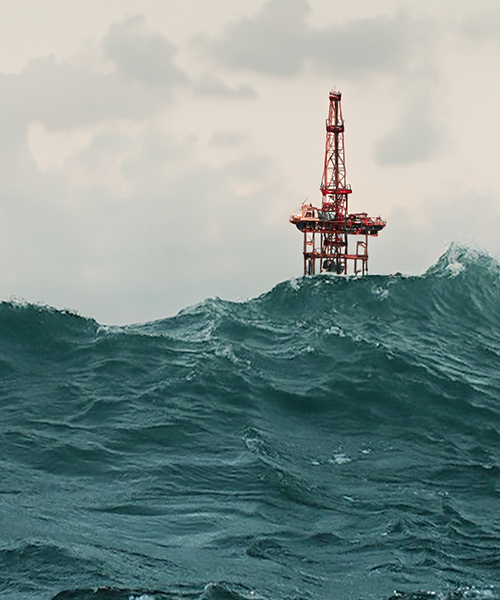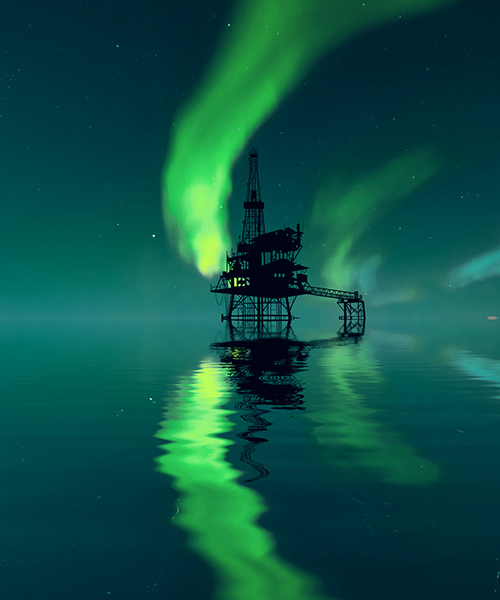September 14, 2021 • 4 min read
Can renewable energy and digital technology decarbonize the North Sea?
What do net zero targets mean for the future of the North Sea?
The UK Continental Shelf (UKCS) has produced around 47 billion barrels of oil equivalent (boe) since production began over half a century ago. However, producing and extracting oil and gas is responsible for around three percent of the UK’s total greenhouse gas emissions today.
“We need to find the solutions now to transform our energy systems while keeping the lights on and industries fueled,” says Jim Lenton, Senior Vice President, Major Projects and Integrated Solutions. “And we also need to do it with a fraction of the CO2 emissions.
“We’ve made some progress on this already. A report by OEUK suggests that the UK offshore oil and gas industry has reduced production emissions by 24 percent compared to 2018. This shows a positive step in the right direction, but there’s a lot left to do.
“Oil and gas producers are struggling to retain their social license to operate and meet their CO2 reduction targets, while they supply the energy needed to meet current demand,” Lenton continues. “That's no mean feat. But with the rise of renewables and increasing digitalization, decarbonization pathways are emerging.”
Adding new technology to old assets
One of the ways digitalization can support the decarbonization efforts in the UKCS is through repurposing aging assets.
“With an aging basin, it’s normal to see assets come to the end of their life. Instead of decommissioning assets, our attention needs to shift to repurposing them, extending their life and upgrading them so they emit a fraction of the CO2,” says Lenton.
“The decarbonization drive starts by benchmarking and publishing carbon metric data. This data is key to understanding how we get to net zero, by using new technologies to forecast production emissions and measure the carbon intensity of modification work.
“This means we can estimate how much carbon we’ll emit by carrying out modification work, weighed against how much carbon will be emitted after. We then use this output to formulate decisions that result in the least CO2 emissions.
“We’re seeing this with the shift in normally staffed assets becoming not permanently attended installations, as new digital technologies enable remote operations,” continues Lenton. “The reduction in travel and supply boats reduces emissions, while making the UKCS safer and extending field life.”
Powering oil and gas with renewables
While net zero is one of the industry’s biggest challenges, it’s also one of the biggest enablers for both innovation and cross sector collaboration.
Oil and gas production assets need to become more sustainable. So, what if we powered these facilities with renewable energy?
By powering assets with renewable electricity instead of traditional gas, we remove the need for gas turbines that require ongoing maintenance. And there’s a growing renewables industry ready to make this happen,” says Lenton.
“The UK supply chain needs to work together to overcome the challenges we’re facing, while having a positive environmental and economic impact. We can take tried-and-tested knowledge from oil and gas and combine it with the current innovation around renewables.
“In doing so, we can accelerate the adoption of renewable while decarbonizing the hydrocarbons industry. However, significant electrical infrastructure is required to umlock this possibility.”
From the North Sea to the world
“To make all this happen, our supply chain contracting model needs to change,” continues Lenton. “How we deliver projects in the future will be assessed on the proportionate value they bring to the customer and the climate. Low cost, reliable delivery solutions will be key.
“We’re now seeing encouragement for more green contracting models through global companies that deliver locally, supported by the North Sea Transition Deal. An agreement between the UK government and the oil and gas iondustry to support an orderly delivery of the UK’s net zero framework.
“If we bring together the technological capabilities of oil and gas, the availability of renewable energy resources, digital technology, and the societal demand for decarbonization, the North Sea could become an example of collaborative decarbonization,” continues Lenton. “We can then lead the world in the transition to lower carbon solutions, exporting this knowledge around the world.
“Decarbonizing the UKCS isn’t going to be simple. And there’s a lot of pressure to get it right,” he says. “But as we remain focused on making sustainable transformation a reality, I’ve never had more faith that we can do it.”



